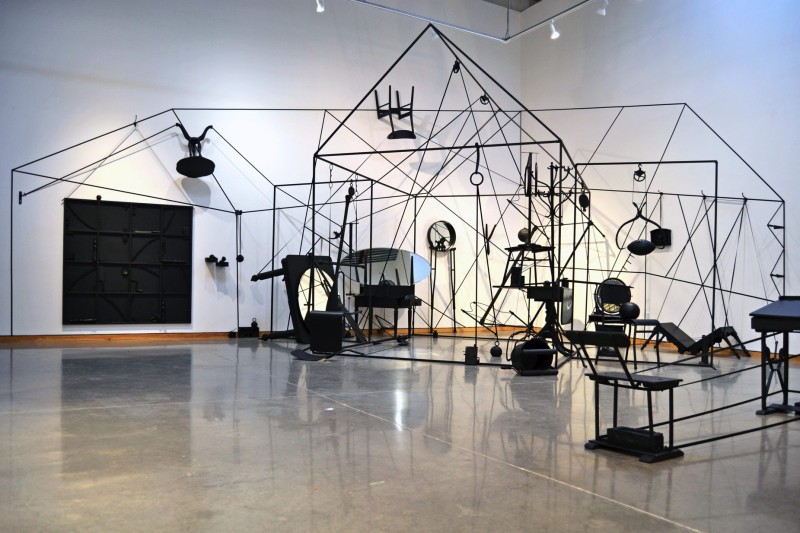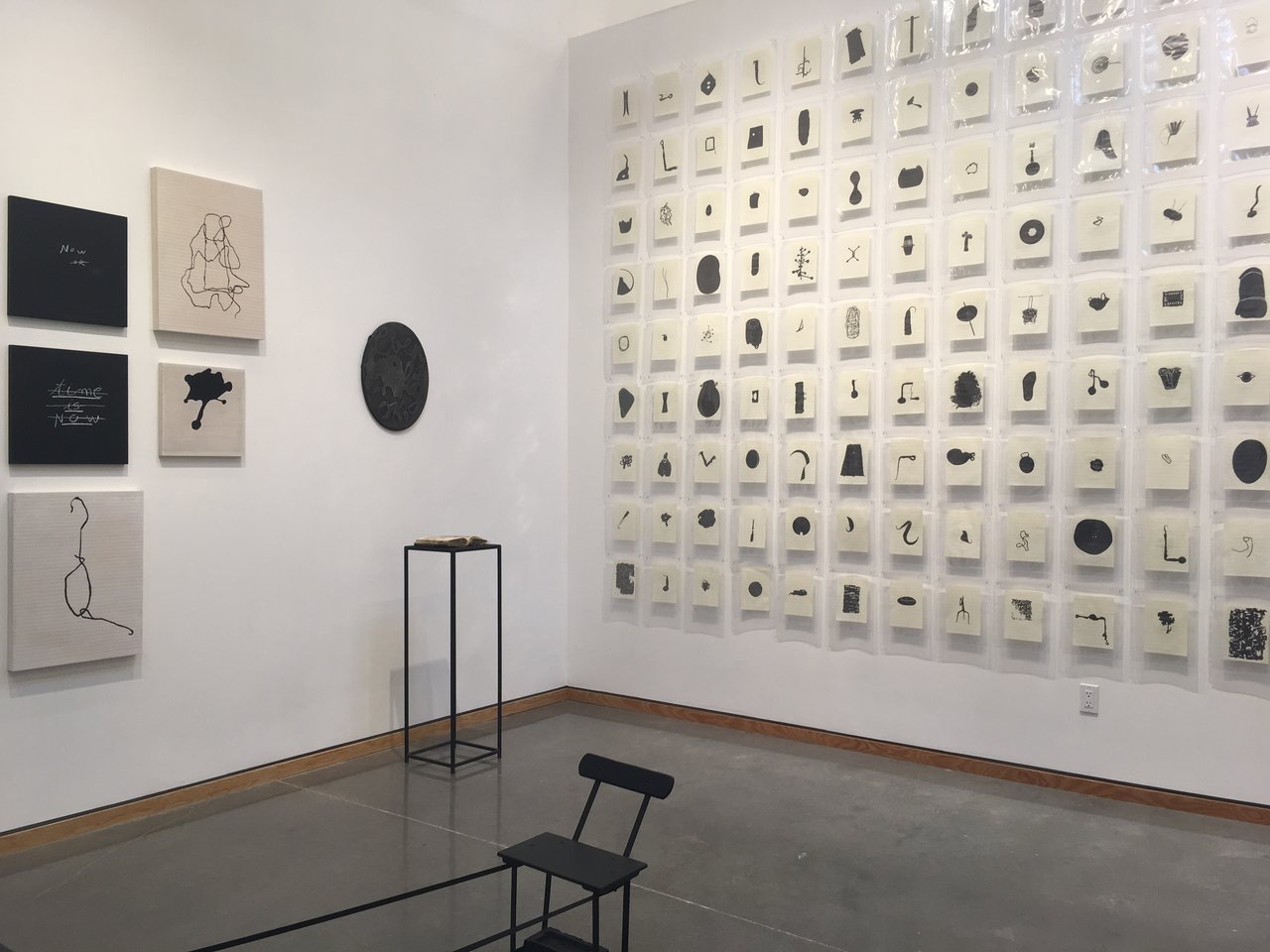 Vessna Perunovich, Shifting Shelter, 2017, site-specific installation, house structure, various found objects, furniture, mirrors chalkboard paint, tape, elastic ribbon with Nothing to Lose, 2017, sculptural installation – small found objects, wooden board, chalkboard paint 60″ x 60″ (left) at Angell Gallery. Courtesy of Angell Gallery
Vessna Perunovich, Shifting Shelter, 2017, site-specific installation, house structure, various found objects, furniture, mirrors chalkboard paint, tape, elastic ribbon with Nothing to Lose, 2017, sculptural installation – small found objects, wooden board, chalkboard paint 60″ x 60″ (left) at Angell Gallery. Courtesy of Angell Gallery
Shifting Shelter explores issues of displacement and uncertainty inherent to the immigrant experience. By force or choice, Perunovich examines the multitude of reasons people move across borders and the effects this can have on an individual’s relationship with time and space. Working with a variety of mediums, the artist has transformed the Angell Gallery into an immersive installation that effectively interrogates perceptions about immigration.
 Vessna Perunovich, Shifting Shelter, 2017, site-specific installation, house structure, various found objects, furniture, mirrors chalkboard paint, tape, elastic ribbon. Photo: Alexis Moline
Vessna Perunovich, Shifting Shelter, 2017, site-specific installation, house structure, various found objects, furniture, mirrors chalkboard paint, tape, elastic ribbon. Photo: Alexis Moline
Entering the gallery space, a disorienting mix of sound and visuals “welcomes” the visitor through a video piece of voices reciting the word in different languages. Set against a simple loop of the view through Perunovich’s studio window, the work is a meditation on the personal and universal nature of movement. This piece is positioned beside a globe, painted matte black like most of the objects in the exhibition. The visual impact of a blacked-out Earth brings into question the colonial purpose of borders, who they have been made for and why. This image also conjures up comparison to a black hole, a space of chaos and suspension that is not fixed in a time or place – a feeling that many immigrants can relate to when forced into upheaval.
 Vessna Perunovich, We Are Here Now, 2017, sculpture, globe, chalkboard paint, engraving, oil pastel, 12″ x 12″ x 15″. Courtesy of Angell Gallery
Vessna Perunovich, We Are Here Now, 2017, sculpture, globe, chalkboard paint, engraving, oil pastel, 12″ x 12″ x 15″. Courtesy of Angell Gallery
However, the hectic mood turns to calm as more time is spent in the gallery digesting Perunovich’s work. Visitors are invited to contemplate and unpack visual cues and familiar objects that had at first impression been rendered sporadic and ambiguous. Mirroring the experience of an immigrant thrust into a new culture, the visitor must work through their surroundings and bring light to the dark.
 Vessna Perunovich, Shifting Shelter, 2017, site-specific installation, house structure, various found objects, furniture, mirrors chalkboard paint, tape, elastic ribbon. Photo: Alexis Moline
Vessna Perunovich, Shifting Shelter, 2017, site-specific installation, house structure, various found objects, furniture, mirrors chalkboard paint, tape, elastic ribbon. Photo: Alexis Moline
Further into the gallery, “The Archive of Insignificant Loses” (2014-2017) occupies an entire wall. The piece is comprised of 126 drawings on notebook pages, keeping a record of lost objects found throughout Perunovich’s travels. Reduced to outlines, the subjects are decontextualized to shapes rendered unrecognizable. However, it is the act of documentation that gives them meaning. Objects often contain intense significance for those that are forced into movement, becoming symbols of a home that cannot easily be returned to. The notion of record keeping speaks to the inconsistent preservation of knowledge in times of conflict. When history has been told by the victor and the truth is increasingly in danger of being hijacked with “alternative facts”, the narratives of civilians directly impacted by domineering forces must be protected. This statement is carried on with “Close Proximity / 104550 Holes Too Many” (2012-2014), a journal with, as the title suggests, 104550 holes burned into it with a incense stick. A burned book, already an emotionally charged symbol, is a harrowing reminder of the erasure of marginalized voices.
 Vessna Perunovich, The Archive of Insignificant Loses (2014-2017) with Close Proximity / 104550 Holes Too Many, 2012-2014, artist book, incense, 11″ x 8″ (center). Photo: Alexis Moline
Vessna Perunovich, The Archive of Insignificant Loses (2014-2017) with Close Proximity / 104550 Holes Too Many, 2012-2014, artist book, incense, 11″ x 8″ (center). Photo: Alexis Moline
Delving deep into the emotional and psychological consequences of exile, Perunovich’s exhibition bears witness to the lost, retelling essential stories in order to give them the recognition they deserve.
Alexis Moline
*Exhibition information: March 11 – April 1, 2017, Angell Gallery, 1444 Dupont St., Unit 15, Toronto. Gallery hours: Wednesday – Saturday, 12 – 5 pm.
